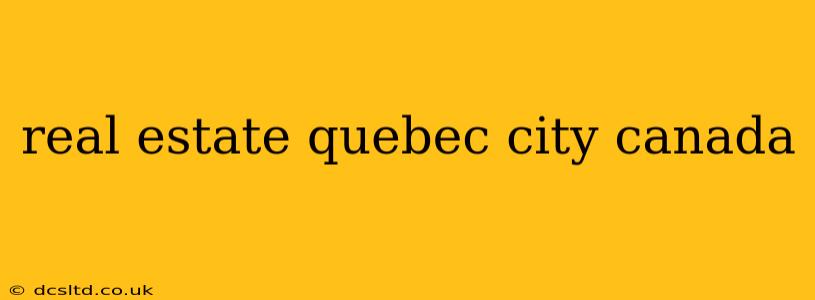Quebec City, a UNESCO World Heritage site, offers a unique blend of European charm and North American convenience, making it a highly desirable location for real estate. Whether you're looking to buy, sell, or simply understand the market, this guide provides a comprehensive overview of the Quebec City real estate landscape.
What are the different types of properties available in Quebec City?
Quebec City's real estate market is diverse, catering to a wide range of preferences and budgets. You can find everything from charming historic homes in the Old Quebec district to modern condos in vibrant neighbourhoods like Sillery and Saint-Roch. Common property types include:
- Single-family homes: These offer ample space and privacy, often with beautiful architectural details, particularly in older neighbourhoods.
- Condos: Ideal for those seeking low-maintenance living, condos are available in various sizes and styles, from cozy studios to spacious penthouses.
- Townhouses: A blend of condo and single-family home living, townhouses offer privacy while minimizing yard maintenance.
- Multi-family dwellings: These are attractive for investors looking for rental income potential.
What are the average prices of homes in Quebec City?
The average price of homes in Quebec City fluctuates based on location, property type, and market conditions. Generally, properties in Old Quebec command higher prices due to their historical significance and location. Newer neighbourhoods or areas further from the city centre tend to be more affordable. Consulting recent real estate listings and market reports from reputable sources will give you the most up-to-date pricing information. It's always best to work with a local real estate agent for the most accurate and current data specific to your search criteria.
What are the best neighborhoods to buy a house in Quebec City?
Several neighbourhoods in Quebec City stand out for their unique character and desirability:
- Old Quebec (Vieux-Québec): While undeniably charming, properties here are typically the most expensive.
- Saint-Roch: A rapidly developing area with a trendy atmosphere, boasting numerous restaurants, boutiques, and cultural attractions. Properties here represent a good balance between price and lifestyle.
- Sillery: A more affluent neighbourhood known for its quiet residential streets, large lots, and proximity to green spaces.
- Cap-Rouge: Located west of the city, Cap-Rouge offers a more suburban feel with access to the St. Lawrence River.
What is the current real estate market like in Quebec City?
The Quebec City real estate market, like many others, is dynamic. It's essential to stay informed about current trends, interest rates, and inventory levels. Working with a knowledgeable real estate agent will help navigate the market's nuances and make informed decisions.
What are the costs associated with buying a house in Quebec City?
Beyond the purchase price, several costs are associated with buying a home in Quebec City, including:
- Land transfer tax: This is a provincial tax based on the property's value.
- Legal fees: You will need a lawyer to handle the legal aspects of the purchase.
- Inspection fees: A home inspection is highly recommended before finalizing the purchase.
- Moving costs: Consider the costs associated with moving your belongings.
How can I find a real estate agent in Quebec City?
Finding a reputable real estate agent is crucial for a smooth and successful transaction. You can search online for agents specializing in Quebec City, read online reviews, and seek recommendations from friends or family.
What are the tax implications of owning property in Quebec City?
Property taxes in Quebec City are levied by the municipal government. The amount you pay will depend on the assessed value of your property. You should also consult with a tax professional to understand the full tax implications of homeownership in Quebec.
This guide provides a starting point for understanding the Quebec City real estate market. Remember that conducting thorough research, working with a local real estate professional, and understanding your personal financial situation are crucial steps in making an informed decision.
